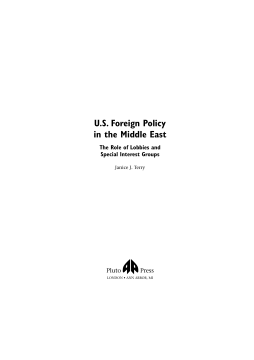
Additional Information
Book Details
Abstract
Millions of dollars are spent every year by companies and special interest groups attempting to influence government policy. They work behind the scenes, lobbying politicians to represent their interests. From tobacco companies, to energy companies, from anti-abortion campaigners to civil rights campaigners, the list is vast. And nowhere is their influence more keenly felt than on the issue of the Middle East.
Israel is America's key ally in the Middle East, and helps maintain US dominance in the region. This book shows how pro-Israeli lobbyists and domestic interest groups have been hugely successful in creating government and financial support for Israel. By contrast, Arab-American groups and Arab governments have had less success putting forward their agendas.
Janice J. Terry shows how special interest groups work, and why certain lobbying techniques are more effective than others. She sets this within the wider cultural context, showing how the US media -- and the general public -- view the Middle East.
To explain how lobbies work, Terry draws on case studies including the Sinai accords and Camp David under Presidents Ford and Carter, the Conflict between Greek and Turkish lobbies over Cyprus, and the major campaign against the Arab boycott.
Making use of primary sources, and unpublished material from various presidential libraries, this is a fascinating expose of the role that lobby groups really play in determining US foreign policy in the Middle East. It will be of interest to students of American politics, and Middle East studies.
